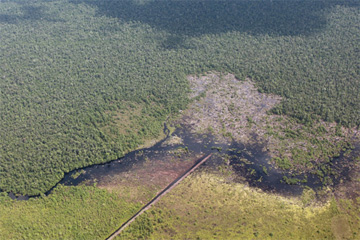Meeting this week in Merida, Mexico, the 9th World Wilderness Congress (WILD9) has released a declaration that calls for increasing wilderness protections in an effort to mitigate climate change. The declaration, which is signed by a number of influential organizations, argues that wilderness areas—both terrestrial and marine—act as carbon sinks, while preserving biodiversity and vital ecosystem services.
Entitled the Merida Message, the declaration put forth by the Chairman and Executive Committee of WILD9, describes the humanity’s current situation as such: “runaway carbon emissions are driving the climate towards irreversible tipping points; we are contaminating our planet with pervasive toxicity, destroying the diversity of life on our planet, exhausting freshwater supplies and causing acidification in our oceans, and over-exploiting our oceans, causing fisheries to collapse. As a result, we are deepening poverty, weakening social structures and threatening global security.”
 Draining and clearing of peat forest in Central Kalimantan, Indonesia. Due to rampant deforestation and destruction of peatlands largely for logging and oil plam and other plantations, Indonesia has the third highest greenhouse gas emissions in the world, only behind China and the United States. Photo by Rhett A. Butler. |
The declaration states that protection of critical wilderness areas will help alleviate these global problems and combat climate change. While reducing fossil fuel emissions is a must, WILD 9 points out that approximately 30 percent of emissions over the past 250 years has come from deforestation and land-use change. Therefore the Merida Message calls for new protections of forests, wetlands, grasslands, and peatlands, all of which store large amounts of carbon.
The Merida Message also calls for greater protection of the ocean’s vegetated habitats, which store vast amounts of carbon. Recent research has found that these habitats—including mangroves, salt marshes, and sea grasses—account for at least 50 percent of all carbon storage in the ocean.
The Merida Message will be making these recommendations at the Copenhagen United Nations Framework Convention on Climate Change (UNFCCC) in December, where it will also call on the UNFCCC and the Convention on Biodiversity (CBD) to integrate efforts to create solutions that mitigate climate change and stem biodiversity loss.
“Wilderness protection on land and sea is key to both of these missions and the UNFCCC and CBD must work in a coordinated and urgent manner to facilitate protecting wilderness around the world,” said WILD9 Chairman Exequiel Ezcurra.
 The Critically Endangered Panama golden frog. The IUCN Red List classifies over 17,000 species, like the golden frog, as threatened with extinction. But this is just a drop in the bucket: the IUCN states that it has only classified 2 percent of the world’s described species. Photo by Rhett A. Butler. |
So far, the Merida Message has been signed by The WILD Foundation, Unidos para la Conservacion, The Wilderness Foundation Africa, The Wilderness Foundation UK, Conservation International, Naturalia, Reforestamos Mexico, Sanctuary Asia, Canadian Parks and Wilderness Society, Canadian Boreal Initiative, and Yellowstone to Yukon Conservation Initiative.
WILD9 expects more signatories before the December meeting in Copenhagen where the declaration will be presented.
The Merida message concludes that the crises facing the world today “is in stark contrast to the world we can have if wilderness and its contribution to natural life support systems are properly valued and protected. Wilderness sustains us, generating the essential services that make possible our economic and social prosperity, our physical health and our spiritual well-being. Our essential choice – indeed, the imperative – has never been clearer.”
Related articles
Alleviating poverty and saving biodiversity are inherently linked argue scientists

(09/17/2009) Twenty-nine scientists argue in Science today that the world will not be able to lift up the world’s poor unless it also addresses global biodiversity loss. They say that the same underlying problems—exploitation of resources, unsustainable overconsumption, climate change, population growth—are exacerbating global poverty and the extinction of species.

(09/24/2009) With the world facing a variety of crises: climate change, food shortages, extreme poverty, and biodiversity loss, researchers are looking at ways to address more than one issue at once by revolutionizing sectors of society. One of the ideas is a transformation of agricultural practices from intensive chemical-dependent crops to mixing agriculture and forest, while relying on organic methods. The latter is known as agroforestry or land sharing—balancing the crop yields with biodiversity. Shonil Bhagwat, Director of MSc in Biodiversity, Conservation and Management at the School of Geography and the Environment, Oxford, believes this philosophy could help the world tackle some of its biggest problems.
(09/15/2009) A group of environmental scientists and economists warn that under current governing models the number and scale of human-caused crises are “outrunning our ability to deal with them”.